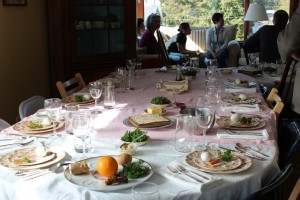
Good morning, Monday! This weekend, we had two treats–(1) it was Passover and we went to Eric’s mom’s cousin’s house for seder, and (2) our dear friend Theresa came to visit from Spokane, which was awesome. Theresa was my first friend when I moved to Seattle in 2004. She and I worked at a coffee shop in the Pike Place Market. She moved to Spokane with her family a couple of years ago and I’ve missed her so much!
I was not raised Jewish and so I’ve only been to a handful of Passover seders with Eric’s family. Passover is a Jewish holiday lasting about a week (usually in April). The seder (pronounced say-der) is the ritual feast that marks the beginning of Passover. The seder involves a ritual storytelling of the liberation of the Israelites from slavery in Egypt. The Haggadah is the book that tells this story and there have been countless versions of the Haggadah, from ancient versions, to handwritten family versions, to our very own “New Seattle Mashup Haggadah”, which the ‘Haggadah committee’ in Eric’s family has put together and reworked each year.
The thing I love most about seder, I think, is that it is a story of liberation. And while it’s specifically a story of liberation for Jews, it is also a story of liberation for all. It’s an opportunity to remember all those who are oppressed–humans and animals–and reflect on our role in their oppression and liberation. It’s a beautiful practice and one that I hope to try to think about a little every day. Liberation for all is an ongoing project and Passover reminds us to be mindful of that.
This year’s Haggadah included an excerpt from The New American Haggadah, which is edited by Jonathan Safran Foer (author of Eating Animals). I really liked this new Preface and I’ve bolded the parts I liked best:
Here we are. Here we are, gathered to celebrate the oldest continually practices ritual in the Western world, to retell what is arguably the best known of all stories, to take part in the most widely practiced Jewish holiday. Here we are as we were last year, and as we hope to be next year. Here we are, as night descends over all of the Jews of the world, with a book in front of us.
Jews have a special relationship to books, and the Haggadah has been translated more widely, and reprinted more often, than any other Jewish book. It is not a work of history of philosophy, not a prayer book, user’s manual, timeline, poem, or palimpsest–and yet it is all of these things. The Torah is the foundational text for Jewish law, but the Haggadah is our book of living memory. We are not merely telling a story here. We are being called to a radical act of empathy. Here we are embarking on an ancient, perennial attempt to give human life–our lives–dignity […]
Here we are: Individuals remembering a shared past and in pursuit of a shared desitiny. The seder is a protest against despair. The universe might appear deaf to our fears and hopes, but we are not–so we gather, and share them, and pass them down. We have been waiting for this moment for thousands of years–more than one hundred generations of Jews have been here as we are–and we will contnue to wait for it. And we will not wait idly.
As you read these words–as our people’s ink-stained fingers turn its wine-stained pages–new Haggadahs are being written. And as future Jews at future tables read those Haggadahs, other Haggadahs will be written. New Haggadahs will be written until there are no more Jews to write them. Or until our destiny has been fulfilled, and there is no more need to say “Next year in Jerusalem”.
And at the end of this Preface page of this year’s Haggadah:
We want all who sit at our table to be comfortable. It doesn’t matter if you are a believer, an agnostic, or an atheist. Nor does it matter if you are a Jew or a non-Jew. The story of Passover transcends these differences.
I won’t go into the whole story here, but the meal involves lots of symbolism, storytelling, singing in English and Hebrew, and the drinking of four glasses of wine:
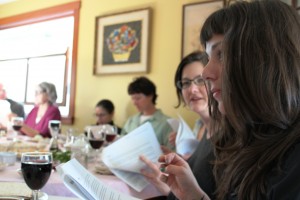
One other bit I liked especially from this year’s Haggadah:
Rabbi Akiva’s disciples asked him: “Master, which principle is chief among these two: compassion for all living creatures or the value of humankind made in the image of God?” “Compassion for all living creatures,” he said, “for when we neglect this we are no longer in the image of God.”
And now, about the food. This year’s seder had many vegan options. One of my favorite foods at Passover is the ‘hillel sandwich’. It’s part of the ritual and it’s matzoh with horseradish and charoset (a salad of apples, nuts, cinnamon, dates, etc). The sweet fruit with the horseradish is a little bit of heaven. Unfortunately, I was far too hungry at that point to remember to take a picture.
For dinner, we had a kick-ass quinoa salad from Eric’s cousin, tzimmes (a delicious sweet, cinnamony root vegetable dish from Eric’s mom), some steamed broccoli, and a yummy kale salad with almonds and other things:
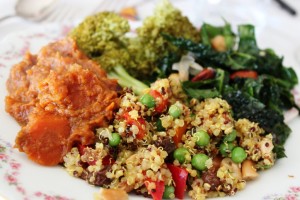
Stay tuned tomorrow for a guest recipe post from Eric’s mom, Ruth, for tzimmes. It’s sweet and warming and some real comfort food.
We brought two desserts that we made from Isa Chandra Moskowitz’s and Terry Hope Romero’s new Vegan Pie in the Sky cookbook. The first was the Strawberry Kiwi Creme Tart:
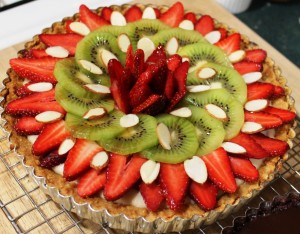
And Lagusta’s Raspberry Chocolate tart (without the raspberries):
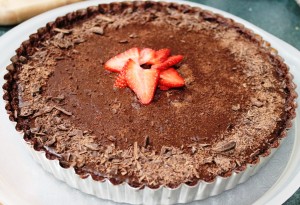
I made substantial tweaks to both recipes to make them Passover-friendly–for instance, I made the Shortbread Tart Crusts (one plain and one chocolate) and used almond meal instead of flour. And the chocolate tart was radically different from the recipe in the book. I’ve always wanted to try making one of those fruit tarts and it was so fun! Decorating the top was the best part. That, and eating the leftover strawberries and kiwis that wouldn’t fit on top.
Did you all celebrate Passover or Easter this weekend? Were there ways that you helped make your celebrations vegan-friendly? Do you each have ways to remind ourselves to mindful of struggles for liberation each day?
 Follow
Follow

Katie, Ruth shared this with me and I am just thrilled that you enjoyed and appreciated the seder and the Haggadah. It’s lovely having you in the family. Love, Susan
Susan-Thank you so much for hosting such a beautiful Seder. We always love being with you guys for Passover. 🙂
what a wonderful looking seder! and those desserts look simply delectable!
They were.
Lucy, wish you could have been there. Jim, thanks! I’m glad you enjoyed them. 🙂